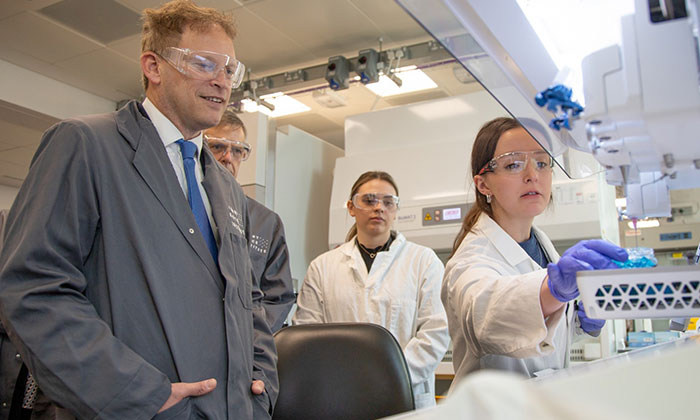Henry Royce Institute receives £95m government funding
04 Nov 2022
Henry Royce Institute headquartered at The University of Manchester receives £95m new government funding for advanced materials research and development

At a visit yesterday (Thursday 3 November) the new Business Secretary, Grant Shapps, has announced a £95m investment to the Henry Royce Institute (‘Royce’) headquartered at The University of Manchester. The funding will enable new advanced materials research and development, critical to sectors including health and energy.
Awarded via the Engineering and Physical Sciences Research Council (EPSRC), it follows an initial £258m government investment made over the course of five years to establish key infrastructure required by the advanced materials sector. Royce aims to support the growth of world-recognised excellence in UK materials research, accelerating commercial exploitation and delivering positive economic and societal impact.
The new funding will enable the Institute to accelerate translational research in advanced materials targeting our biggest challenges, providing access to research capabilities, identifying opportunities for collaboration between businesses and researchers and developing the next generation of materials scientists.
During his first official visit in his new role as Business Secretary, Grant Shapps said: 'R&D investment is a critical way to turbocharge Britain’s growth. Growing an economy fit for the future means harnessing the full potential of advanced materials, making science fiction a reality by supporting projects from regenerative medicine to robots developing new recycling capabilities, right across the country - including here in the heart of Manchester.
'Today’s £95 million investment will do just that, bringing together the brightest minds across our businesses and institutions to help future-proof sectors from healthcare to nuclear energy.
‘Today’s £95m investment will do just that, bringing together the brightest minds across our businesses and institutions to help future-proof sectors from healthcare to nuclear energy.’
Professor David Knowles, Royce CEO said: ‘Royce and its partners across the UK, along with the advanced materials community, is very pleased to be able to confirm this Phase ll EPSRC funding. Innovation in advanced materials underpins a wider range of our industrial sectors and is fundamental to our economic growth.
‘Our Partnership offers a unique combination of materials science expertise, state-of-the-art laboratories and fantastic collaboration spaces for the advanced materials community. As we enter our Phase ll operations we are focused now, more than ever, on working with the community to identify the key challenges and opportunities ahead of us and supporting the translation of innovative research into the viable products and systems needed to ensure a sustainable future for us all.’
EPSRC Executive Chair Professor Dame Lynn Gladden said: ‘Advanced materials are crucial to driving growth across our key industries, from energy and transport to health, and ensuring they are sustainable for the future. This funding will build on the success of the Henry Royce Institute so far, to unleash the potential of this transformative technology for the benefit of the economy and the environment.’
University of Manchester President and Vice-Chancellor, Professor Dame Nancy Rothwell said: ‘I am delighted that the fantastic work of the Royce in this sector has been recognised by this major award from EPSRC, further reinforcing Manchester’s place at the epicentre of this revolutionary area of research and development.’
Advanced Materials
Advanced materials is one of The University of Manchester’s research beacons - examples of pioneering discoveries, interdisciplinary collaboration and cross-sector partnerships that are tackling some of the biggest challenges facing the planet.
Advanced materials and manufacturing were identified in the government’s Innovation Strategy as one of seven technology families in which the UK has globally competitive R&D and industrial strength.
